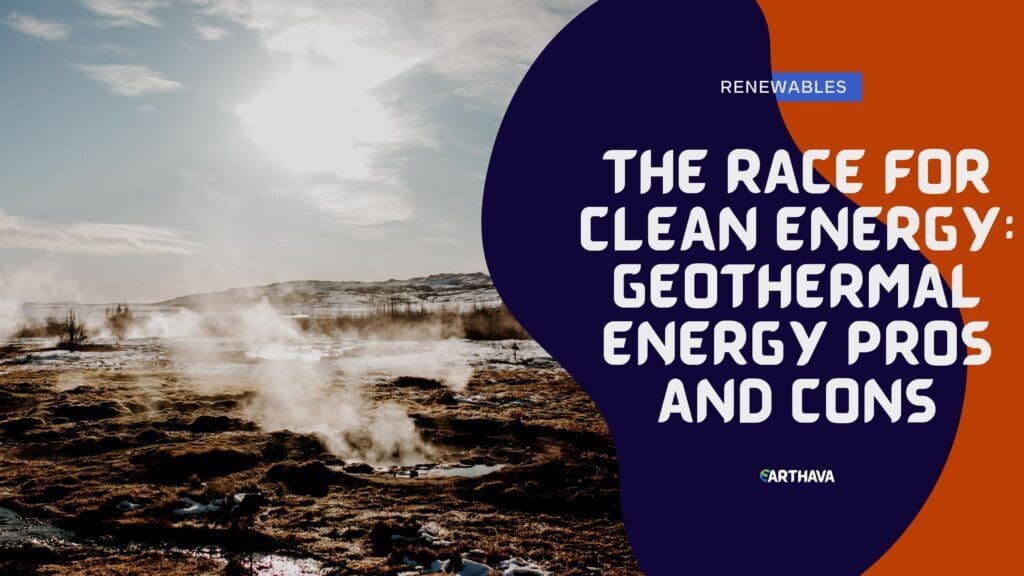Our planet is dying—and it’s thanks to humans. The damage we’ve done to the environment is causing extinction and biodiversity loss at an unprecedented rate. And unless we take immediate action, our world could be unrecognizable in a few decades.

So how can we stop this trend? One of the best ways is to exchange fossil fuels for renewable sources like solar, wind, and geothermal energy.
But what is geothermal energy, and is it worth it? Read on to learn more and explore some geothermal energy pros and cons.
What Is Geothermal Energy?
Geothermal energy comes from the heat that’s already trapped deep within the earth. This heat energy originates from a combination of sunlight and pressure, melting the earth’s core into magma. It’s released in the form of volcanoes, or, if it comes in contact with groundwater, geysers.
Geysers are the eruption of steam through the earth’s crust. When this steam is captured it can turn a generator that creates electric power. The steam cools and condenses into water, and is then redistributed back into the earth.
This steam can also be produced by injecting water near the geothermal heat source. Water from a clean, natural reservoir is preferable, but any water will do—even recycled wastewater.
How Is Geothermal Energy Used?
Geothermal energy can be used to harness electricity for individual homes and large-scale power grids alike. It’s also useful for the natural heating and cooling of homes, greenhouses, spas, and health clinics. It can even be used to warm and de-ice roads!
According to the World Energy Council, China and the United States are the top-producing countries for geothermal energy. Europe and Asia produce the most per continent, with an annual amount of 29 and 27.5 gigawatts respectively.
That sounds like a lot, but geothermal energy still only accounts for under 1% of the world’s electricity. It’s not a problem with supply—the earth has plenty of heat to go around—it’s because of our hesitancy to adopt renewable fuel sources.
Geothermal Energy Pros and Cons
All renewable energy sources have countless advantages over fossil fuels. But no form of energy production—even geothermal—is without flaw. Let’s dig a little deeper into the pros and cons of the power source beneath our feet.
Advantages of Geothermal Energy
The most significant advantage of geothermal energy is that it’s completely renewable. In other words, there’s no way to exhaust the supply of energy provided by the reservoirs. The water is naturally replenished and the earth is always creating more heat.
Another major plus of geothermal energy is that it’s consistent. Unlike solar and wind power, which depend on specific weather conditions, geothermal reservoirs produce a constant and predictable amount of energy. Between this and its potential to generate massive amounts of electricity and heat, geothermal energy is perfect for meeting the base energy demand of a power grid.
Geothermal power is also very environmentally friendly. Its carbon footprint is much smaller than conventional fuels, and it doesn’t need combustion to produce energy. And because the power systems can be built vertically and/or partially underground, their land usage is comparatively low.
Finally, geothermal energy systems are both efficient and easy to maintain. Geothermal home heating systems can last from 25-50 years with only annual equipment checks and filter changes. They’re also up to 65% more efficient than conventional HVAC units.
Disadvantages of Geothermal Energy
The largest disadvantage of geothermal energy is the high up-front cost of installation. Before a large power system can be installed, money and time must be spent to locate and drill into an efficient reservoir. Combined with the construction costs, this makes geothermal plants one of the most expensive methods of electricity production.
Home heating and cooling systems are also expensive but, due to their efficiency, can pay themselves off over time. Initial installation prices can range anywhere from $3,000-$30,000. It can take up to ten years to recoup the expense, so it’s best viewed as a long-term investment.
Some people are also concerned that geothermal power plants contribute to pollution. Drilling into the earth’s crust indeed releases greenhouse gases that are trapped beneath the surface. Even so, the pollution released by geothermal plants is marginal compared to that created by the harvesting and use of coal and petroleum.
Another criticism of geothermal power plants is their potential to cause earthquakes. The hydraulic fracturing used to develop land for geothermal systems can cause ground instability, which has caused localized tremors in both Germany and New Zealand. Thankfully, smaller fractures are less likely to create instability so your geothermal home heating system won’t cause an earthquake.
The other disadvantage is that geothermal systems are location-dependent. The only way to generate energy efficiently is to drill in an area that has good reservoirs close to the earth’s surface. These places are often remote, meaning that power has to be re-routed to its point of use.
So, Is Geothermal Energy Worth It?
The startup costs of geothermal energy may be high, but the cost of using fossil fuels at our current rate is higher.
It isn’t the best choice for every location. However, some areas, like Iceland and the Philippines, can use it to generate a significant amount of their power. When used in combination with other renewable fuels and power sources, geothermal energy can take us closer to breaking our reliance on oil, coal, and gasoline.
Can Geothermal Energy Save the Planet?
The geothermal energy pros and cons balance out in favor of the advantages. And while adopting geothermal energy on a large scale won’t save the planet by itself, it is a huge step in the right direction.
Are you thinking about using geothermal energy to power your next house? Read more about why new homes should be built with geothermal power in mind.
